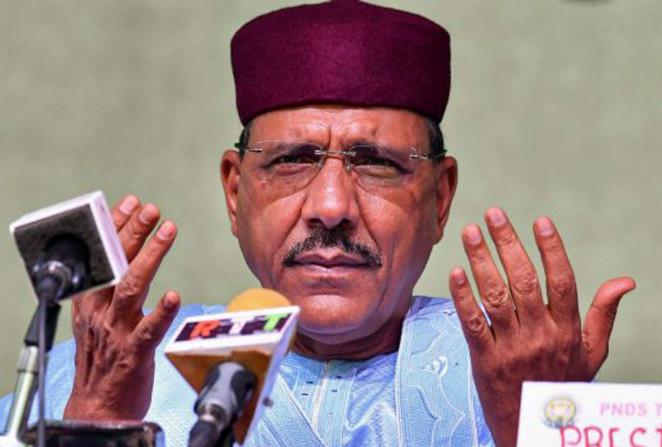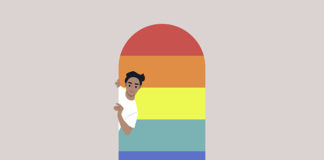The president of the West African nation of Niger is laying the groundwork for enacting harsh anti-homosexuality laws in his country, where same-sex intimacy is currently legal. He proposes the death penalty for people in same-sex marriages.

Mohamed Bazoum, president of Niger, is preparing for a newly established committee of experts to develop the new anti-homosexuality laws. He envisions those laws as part of the committee’s mission to review the nation’s longstanding French-inspired penal code and adapt it to the “economic and social realities” of Niger.
Bazoum presented details of his plans for anti-homosexuality laws during a recent radio broadcast on the public radio station La Voie du Sahel. A quickly translated transcript of that broadcast is printed below.
After that transcript is an interview with Djapharou Saoude Hirokoye (pseudonym), an observer who explains the political and social context of Bazoum’s initiative.
Speaking on the public radio station La Voie du Sahel this week, Bazoum said:
“This is a multi-disciplinary committee composed of representatives of the presidency, the president’s office, the National Assembly, officers of the judicial police, magistrates and members of the bar. People from civil society also participate, such as teachers, researchers and members of the public and private press.
“Niger’s penal code dates back to 1810 and, with the exception of a few scattered modifications, it has never been subject to a thorough overhaul. For example, there is only one article in the penal code that deals with homosexuality, Article 282, and this article only punishes sexual relations with a minor under the age of 21.
“In the future penal code, there will be a whole section dedicated to homosexuality. Nevertheless, this led us to define homosexuality, with the different categories that it covers. … After this definitional work, we then thought about the offenses and the penalties. In any case, there will be a repeal of Article 282 in its current form.”

Bazoum continued:
“Anyone who has feelings of love for someone of his own sex will be subject to an offense, to punish this deviance. For example, kissing another man when you are a man or kissing a woman when you are a woman will be punished… This will also be the case for caresses or other signs of affection.
“Then, a sexual relationship between people of the same sex, whatever the age, will constitute another offense. On the other hand, age will also be an aggravating circumstance of the offense, in a case where the partner is a minor.”
The average age of the population of Niger is 16.
Bazoum added:
“In addition, marrying someone of one’s own sex will now be considered a crime, which implies penalties that can range from 10 years of criminal imprisonment to life imprisonment or the death penalty.
“The person who officiates the marriage, such as a marabout [Muslim spiritual leader] or a registrar, will be tried for a crime like the bride and groom, with similar penalties. The same applies to priests.
“The parent who has given his child in [that] marriage will be similarly punished for a crime. The same applies to witnesses or groomsmen, who will be punished by the law.
“Finally, any natural person who runs or finances a homosexual club in public or in private will be punished by imprisonment and a fine. Legal entities that manage, assist, proselytize or finance LGBT groups or even individuals in this category will be subject to prosecution.”

Erasing 76 Crimes interviewed Diapharou Saoude Hirokoye about Niger:
What triggered this legal offensive against LGBTI people in Niger ?
Djapharou Saoude Hirokoye: In October 2022, MP Nana Djoubie filed a bill to pave the way for the criminalization of homosexuality in Niger, as young lesbians prosecuted for indecent exposure, could not be convicted because of their love orientation, as homosexuality is not an offense in Niger.
Subsequently, this snowballed, as the Association of Muslim Students of Niger (AEMN) became involved. Today, all over Niger, this is all that is being talked about.
The arguments heard in the public debate reveal the fear that homosexuality will spread, with a fear of contagion of the social body.

Niger has recently experienced the first public demonstrations of LGBTI people in its history, addressing their own sexual orientation and living conditions, through the demands of asylum seekers from Cameroon, Liberia and Côte d’Ivoire. The way they used the media, dressed, behaved and proudly waved rainbow flags caused a stir throughout the country.
For the peace of mind of Niger’s native LGBTI community and for their own safety, I think it would be good if they left with the help of the UNHCR, as so far they have only managed to raise public outcry by refusing to bow to local discretion.
To return to Ms. Djoubie’s bill, it could not be acted upon at the end of last year because the parliamentary calendar was already full. However, it will most certainly be supported with a broad consensus in 2023. Indeed, although Niger is a secular state, politicians are aware that homosexuality is condemned by all religions, including Islam, which is in the majority here. [Editor’s note: Homosexuality is not condemned by all religions.]
For my part, I think that this situation leads to the need for caution. Also, I don’t quite understand why the president is talking about banning gay marriage, because I have never heard of such a thing in my very conservative country. I am also bitterly disappointed that people confuse gender identity with sexual orientation when it comes to effeminate people.
Effeminate people have always been part of our culture by organizing traditional wedding ceremonies. In fact, this is what they do most often for a living, as otherwise they have no male friends and few other means of support.
Finally, there is a lot of hypocrisy, because male prostitution is something that really runs rampant in Niamey. When you see these handsome young men who don’t work, who sleep all day and who show off the latest phones, you understand a lot.
If you would like to get in touch with Djapharou Saoude Hirokoye, you can write to him at info@76crimes.com.
Related articles :








